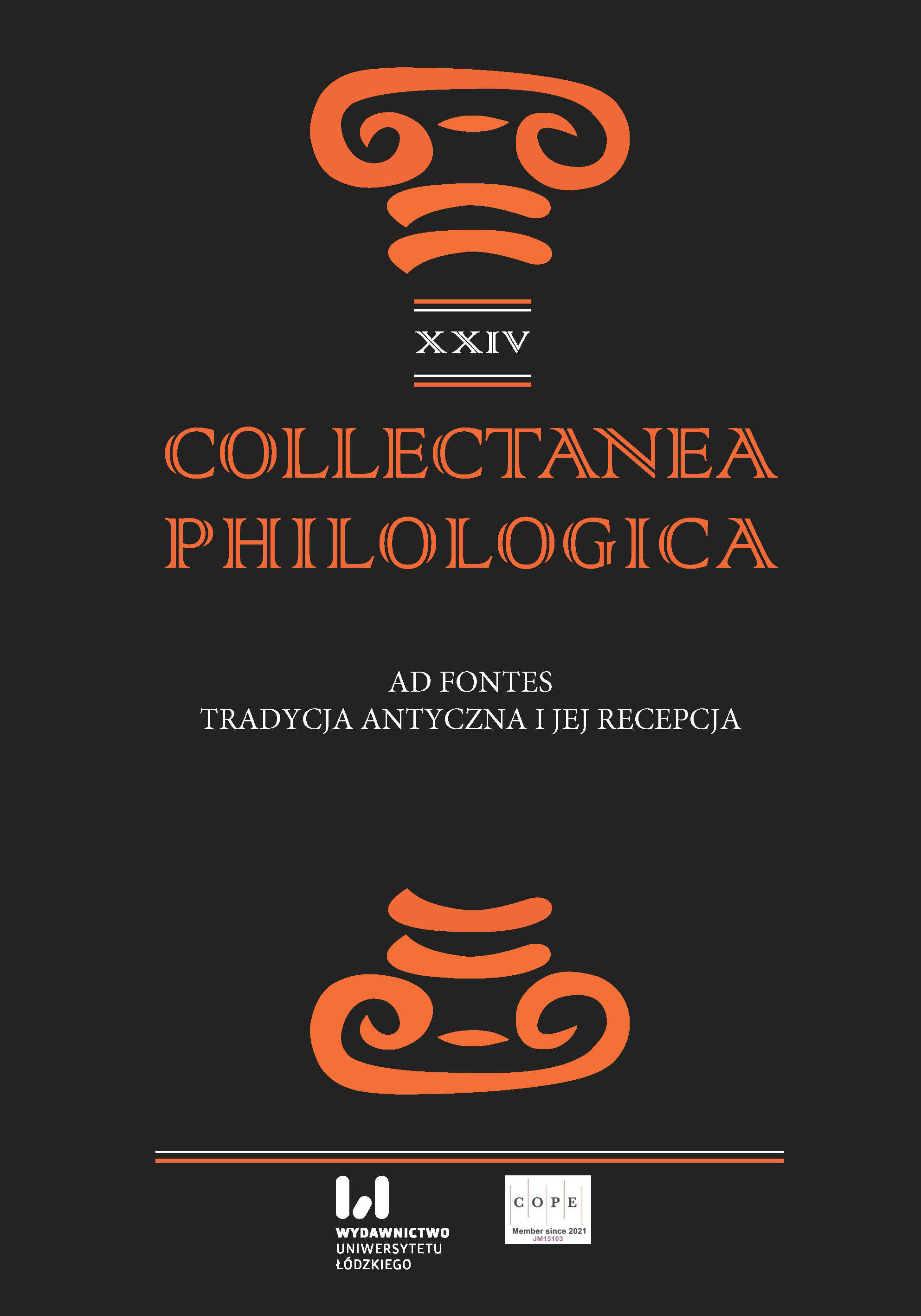Minima Onomastica Graeca Alpharabia: Notes on the Treatise "Tafsir Asma Al-Hukama"
DOI:
https://doi.org/10.18778/1733-0319.24.08Słowa kluczowe:
Platon, Al-Farabi, onomastyka, etymologia, filologia, hologramAbstrakt
One of the treatises attributed to the scholar and philosopher al-Farabi is the fascinating single- page manuscript entitled tafsir asma al-hukama, a small document containing a shorthand inventory of fourteen Greek names. Although the authenticity of the attribution is still debated, the treatise itself demonstrates that its author had a strong interest in the interplay of philology and philosophy – a theme that first appears in a remarkable passage in Plato’s Politeia, namely Book IX, 582e. This paper therefore will examine the nature of the tafsir asma al-hukama, especially with regard to the title, which I leave untranslated until the last part of the paper, since the exact meaning of the words in the title forms a major part of my argument. Although the tafsir asma al-hukama is seemingly a very minor text, I believe that it represents a fascinating moment in the history of the dialogue between philology and philosophy. The result of my examination, then, will be a kind of maxima in minimis or hologram on a minor scale. I shall begin with a discussion of the importance of ism in al-Farabi.
Bibliografia
Alon, I. (2007). Al-Farabi Philosophical Lexicon. E.J.W. Gibb Memorial Trust.
Google Scholar
Arnaldez, R. (1977). “Pensée et langage dans la philosophie de Fārābī (a propos du ‘Kitāb Al-Ḥurūf’)”. Studia Islamica 45. 57–65 https://doi.org/10.2307/1595425
Google Scholar
DOI: https://doi.org/10.2307/1595425
Auroux, S. (1985). La Linguistique fantastique. Paris: Joseph Clims.
Google Scholar
Badawi, Abd al-Rahman. (1980). Aflatun fi al-Islam. Beirut: Dār al-Andalus.
Google Scholar
Bakr, Al-Sayyid Yaqub. (1969). Nusus fi Fiqh al-lughah al-ʻarabīyah. Beirut: Maktabat Libanān.
Google Scholar
Blanár, V. (2009). Proper names in the light of theoretical onomastics. Martin: Matica slovenská. urn: nbn:de: bsz:15-qucosa-145141.
Google Scholar
Clarke, M. The Semantics of Colour in the Early Greek Word-Hoard https://dahphd.academia.edu/MichaelClarke
Google Scholar
Dodge, B. (ed. et trans.) (1970). The Fihrist of Al-Nadim: A Tenth-Century Survey of Muslim Culture. Columbia University Press.
Google Scholar
Eichler, E. et al. (1995). Namenforschung: Ein internationales Handbuch zur Onomastik. Vol. 1. Berlin–Boston: De Gruyter Mouton.
Google Scholar
DOI: https://doi.org/10.1515/9783110114263.1.1.210
Jihami, J. (2002). Mawsut Mustalahat al-Kindi wa al-Farabi. Bayrūt: Maktabat Lubnān Nāshirūn.
Google Scholar
Lane, E.W. (2003). Arabic English Lexicon. Educa Boos /AES.
Google Scholar
Mahdi, M.S. (ed.). (1969). Alfarabi’s Book of Letters. Beirut: Dar al-el-Mashreq.
Google Scholar
Mahdi, M.S. (2001). Alfarabi and the Foundation of Islamic Political Philosophy. The University of Chicago Press https://doi.org/10.7208/chicago/9780226774664.001.0001
Google Scholar
DOI: https://doi.org/10.7208/chicago/9780226774664.001.0001
Makdisi, G. (1990). The Rise of Humanism in Islam. Edinburgh University Press.
Google Scholar
Newman, J.K. (2002–2003). “Philologists or Philosophers?”. Illinois Classical Studies 27/28. 197–212.
Google Scholar
Platnauer, M. (1921). “Greek Colour-Perception”. The Classical Quarterly 15, 3/4. 153–162 https://doi.org/10.1017/S0009838800000616
Google Scholar
DOI: https://doi.org/10.1017/S0009838800000616
Reeve, C.D.C. (Trans.). (1998). Plato’s Cratylus. Hackett Publishing Company.
Google Scholar
Rosenthal, F. (1942). “A Short Treatise on the Meaning of the Names of Some Greek Scholars”. Journal of the American Society 62(1). 73–74 https://doi.org/10.2307/594104
Google Scholar
DOI: https://doi.org/10.2307/594104
Sezgin, F. (1975). Geschichte des arabischen Schrifttums (GAS). Vol. 2. Leiden: Brill.
Google Scholar
Sezgin, F. (1982). Geschichte des arabischen Schrifttums (GAS). Vol. 8. Leiden: Brill.
Google Scholar
DOI: https://doi.org/10.1163/157006482X00151
Sezgin, F. (1984). Geschichte des arabischen Schrifttums (GAS). Vol. 9. Leiden: Brill.
Google Scholar
Versteegh, K. (2008). La grande etymologie d’Ibn Ginni. In: Versteegh, K. (ed.). Encyclopedia of Arabic Language and Linguistics. Vol. 3. Leiden: Brill. 44–50.
Google Scholar
Zimmermann, F.W. (1991). Al-Farabi’s Commentary and Short Treatise on Aristotle’s “De interpretatione”. Oxford University Press.
Google Scholar
Zuckermann, G. (2006). ‘Etymythological othering’ and the power of ‘lexical engineering’ in Judaism, Islam and Christianity. In: Omoniyi, T., Fishman, J.A. (eds.). Explorations in the Sociology of Language and Religion. Amsterdam: John Benjamins Publishing Company https://doi.org/10.1075/dapsac.20
Google Scholar
DOI: https://doi.org/10.1075/dapsac.20.19zuc
Pobrania
Opublikowane
Jak cytować
Numer
Dział
Licencja

Utwór dostępny jest na licencji Creative Commons Uznanie autorstwa – Użycie niekomercyjne – Bez utworów zależnych 4.0 Międzynarodowe.












